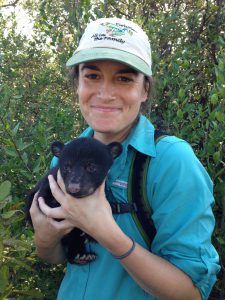By Teresa Suits, agricultural education and communication master’s student (BS ’17)
During Women’s History Month, the UF/IFAS College of Agricultural and Life Sciences (CALS) will be sharing stories of how graduate students support undergraduate students in the areas of science, technology, engineering and math.
For the past year, wildlife ecology and conservation post-doctoral associate Sarah Duncan has mentored Sarina Weiss, an undergraduate student in the College of Agricultural and Life Sciences (CALS), through research. Together, they are just one example of how CALS female students support one another to be researchers, scientists, teachers, leaders or whatever their career goals may be.
 In the UF/IFAS wildlife ecology and conservation department, Duncan works on a multi-state collaborative project looking at the genetics and ecology of southeastern pocket gophers. Her undergraduate mentee, Weiss, is conducting an independent study examining if areas with the gophers have higher levels of plant diversity than areas without the gophers.
In the UF/IFAS wildlife ecology and conservation department, Duncan works on a multi-state collaborative project looking at the genetics and ecology of southeastern pocket gophers. Her undergraduate mentee, Weiss, is conducting an independent study examining if areas with the gophers have higher levels of plant diversity than areas without the gophers.
Through this mentorship, Duncan hopes she has taught Weiss to have confidence in herself as a female researcher. “Science has historically been a male-dominated field, but that is changing,” Duncan said. Confidence is a key part of the change process, and Duncan hopes Weiss will have confidence in her “ideas, work and contribution to science.”
As a mentor, Duncan learned a great deal about working with students and how to best teach them. “One of the biggest things I’ve learned is it is important to listen to students and their interests, and to build a project around something that they created,” Duncan said. Weiss was interested and passionate about plant identification, so Duncan used her passion and interest as a focal point for their collaborative research. “It is great when you have a student come to you with ideas, so you can build on their interests,” Duncan said.
Duncan has found the mentorship process to be affirming in her decision to remain in academia. “It is really fulfilling to see someone you take on very early in their career, work with them to build a necessary foundation, and witness the great things they do,” said Duncan.
Women’s History Month means different things to different people, but for Duncan, “it is an amazing time to reflect on diversity, in science in particular, and how we as an academic community can be more inclusive.”
 0
0
